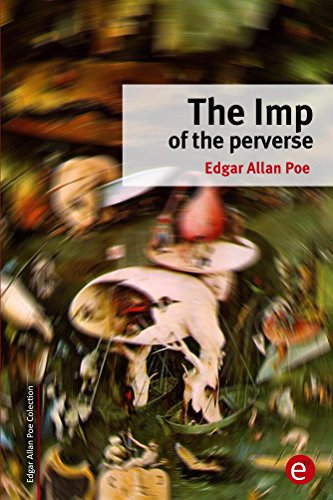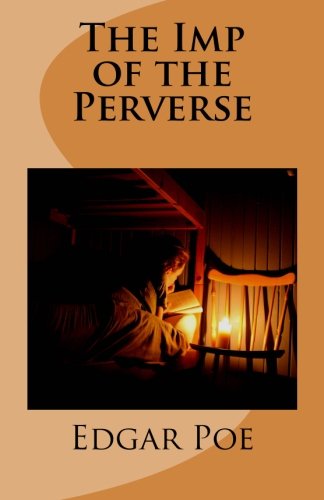-
The Imp Of The Perverse
Edgar Allan Poe
language (Otbebookpublishing, Dec. 27, 2015)The narrator explains at length his theory on which he believes causes people to commit acts against their self-interest. This essay-like discussion is presented objectively, though the narrator admits that he is "one of the many uncounted victims of the "Imp of the Perverse". He then explains how his conviction for murder was the result of this. The narrator murders a man using a candle that emits a poisonous vapor. The victim enjoyed reading in bed at night and, using the candle for illumination, dies in his poorly-ventilated room. No evidence is left behind, causing the coroner to believe the man's death is an act of God. The narrator inherits the man's estate and, knowing he can never be caught, enjoys the benefits of his murderous act for many years…(Excerpt from Wikipedia)
-
The Imp of the Perverse
Edgar Allan Poe, Russell Lee
(CreateSpace Independent Publishing Platform, April 15, 2016)This Edgar Allan Poe short story dives into the self destructive impulses of an unnamed narrator.
-
The Imp of the Perverse
Edgar Allan Poe
language (CDED, March 20, 2018)"The Imp of the Perverse" is a short story by 19th-century American author and critic Edgar Allan Poe. Beginning as an essay, it discusses the narrator's self-destructive impulses, embodied as the symbolic metaphor of The Imp of the Perverse. The narrator describes this spirit as the agent that tempts a person to do things "merely because we feel we should not."The narrator explains at length his theory on "The Imp of the Perverse", which he believes causes people to commit acts against their self-interest. This essay-like discussion is presented objectively, though the narrator admits that he is "one of the many uncounted victims of the Imp of the Perverse".[1] He then explains how his conviction for murder was the result of this.
-
The Imp of the Perverse: by Edgar Allan Poe
Edgar Allan Poe
language (, Dec. 8, 2017)The Imp of the Perverseby Edgar Allan PoeFiction Horror Short Stories
-
The Imp of the Perverse
Edgar Allan Poe
language (, Jan. 31, 2020)"The Imp of the Perverse" is a short story by 19th-century American author and critic Edgar Allan Poe. Beginning as an essay, it discusses the narrator's self-destructive impulses, embodied as the symbolic metaphor of The Imp of the Perverse. Wikipedia
-
The Imp of the perverse
Edgar Poe
language (Ediciones74, Feb. 1, 2015)We have a task before us which must be speedily performed. We know that it will be ruinous to make delay. The most important crisis of our life calls, trumpet-tongued, for immediate energy and action. ... It must, it shall be undertaken to-day, and yet we put it off until to-morrow, and why? There is no answer, except that we feel perverse, using the word with no comprehension of the principle. ... [Then] The clock strikes, and is the knell of our welfare. At the same time, it is the chanticleer-note to the ghost that has so long overawed us. It flies—disappears—we are free. The old energy returns. We will labor now. Alas, it is too late!
-
The Imp of the Perverse
Edgar Allan Poe
language (, May 31, 2017)The Imp of the Perverseby Edgar Allan PoeFiction Horror Short Stories
-
The Imp of the Perverse
Edgar Allan Poe
language (Shaf publishers, Feb. 27, 2016)The life of American writer Edgar Allan Poe was characterized by a dramatic series of successes and failures, breakdowns and recoveries, personal gains and hopes dashed through, despite which he created some of the finest literature the world has ever known. Over time his works have influenced such major creative forces as the French poets Charles Baudelaire and Andre Gide, filmmaker D.W. Griffith and modern literary legend Allen Ginsberg. Best known for his poems and short fiction, Poe perfected the psychological thriller, invented the detective story, and rarely missed transporting the reader to his own supernal realm. He has also been hailed posthumously as one of the finest literary critics of the nineteenth century. In Edgar Allan Poe: Complete Tales and Poems fans may indulge in all of Poe's most imaginative short-stories, including The Fall of the House of Usher, The Murders in Rue Morgue, The Tell-Tale Heart, Ligeia and Ms. In A Bottle. His complete early and miscellaneous poetic masterpieces are also here, including The Raven, Ulalume, Annabel Lee, Tamerlane, as well as select reviews and narratives.
-
The Imp of the Perverse
Edgar Allan Poe
language (WS, May 21, 2019)"The Imp of the Perverse" is a short story by 19th-century American author and critic Edgar Allan Poe. Beginning as an essay, it discusses the narrator's self-destructive impulses, embodied as the symbolic metaphor of The Imp of the Perverse. The narrator describes this spirit as the agent that tempts a person to do things "merely because we feel we should not."The narrator explains at length his theory on "The Imp of the Perverse", which he believes causes people to commit acts against their self-interest. This essay-like discussion is presented objectively, though the narrator admits that he is "one of the many uncounted victims of the Imp of the Perverse".[1] He then explains how his conviction for murder was the result of this.
-
The Imp of the Perverse
Edgar Allan Poe
language (, Oct. 8, 2017)The Imp of the Perverseby Edgar Allan PoeFiction Horror Short Stories
-
The Imp of the Perverse
Edgar Allan Poe
(CreateSpace Independent Publishing Platform, Nov. 26, 2013)"The Imp of the Perverse" is a short story that begins as an essay written by 19th-century American author and critic Edgar Allan Poe. It discusses the narrator's self-destructive impulses, embodied as the symbolic metaphor of The Imp of the Perverse. The narrator describes this spirit as the agent that tempts a person to do things "merely because we feel we should not." The narrator explains at length his theory on "The Imp of the Perverse", which he believes causes people to commit acts against their self-interest. This essay-like discussion is presented objectively, though the narrator admits that he is "one of the many uncounted victims of the Imp of the Perverse". He then explains how his conviction for murder was the result of this. The narrator murders a man using a candle that emits a poisonous vapor. The victim enjoyed reading in bed at night and, using the candle for illumination, dies in his poorly-ventilated room. No evidence is left behind, causing the coroner to believe the man's death is an act of God. The narrator inherits the man's estate and, knowing he can never be caught, enjoys the benefits of his murderous act for many years. The narrator remains unsuspected, though he occasionally reassures himself by repeating under his breath, "I am safe". One day, he notes that he will remain safe only if he is not foolish enough to openly confess. In saying so, however, he begins to question if he is capable of confessing. He fearfully runs through the streets, arousing suspicion. When finally stopped, he feels struck by some "invisible fiend". He reveals his secret with "distinct enunciation", though in such a hurry as if afraid of being interrupted. He is quickly tried and convicted of murder and sentenced to death by hanging. "The Imp of the Perverse" begins as an essay rather than as a work of fiction, a format that Poe previously used in "The Premature Burial". It is, therefore, less about plot and more about theory. As Poe describes this theory: We stand upon the brink of a precipice. We peer into the abyss—we grow sick and dizzy. Our first impulse is to shrink away from the danger. Unaccountably we remain... it is but a thought, although a fearful one, and one which chills the very marrow of our bones with the fierceness of the delight of its horror. It is merely the idea of what would be our sensations during the sweeping precipitancy of a fall from such a height... for this very cause do we now the most vividly desire it. The work theorizes that all people have self-destructive tendencies, including the narrator. The narrator's ultimate confession as a murderer is not inspired by any feelings of guilt but, instead, from a desire to publicize his actions despite knowing that he should not.
-
The Imp of The Perverse
Edgar Allan Poe
(BookSurge Classics, Feb. 2, 2004)A man stands on the edge of a cliff, knowing it will be suicide to jump off, yet he wonders what it would be like. Like reading? Check out this series. SHADES OF GRAY SERIES 1. Noir, City Shrouded By Darkness (Kindle B0026Q8044 or for Mobipocket 2.0 Version SHADES OF GRAY BOOK ONE 2. From Moscow, With Love (Kindle B001MSI2WC or Mobipocket 0979857511 ) 3. Cerberus Versus Pandora (Kindle B001MSI2WM or Mobipocket 097985752X ) 4. Sisters (Kindle B001MSI2WW or Mobipocket 0979857538 ) 5. Night of the Twilight- the Chimera Strain *Sneak Peek* (*1st of zombie Twilight Quadrilogy) (Kindle B001MQCADQ or Mobipocket 0979857546 )- Full Version Coming Soon 06/2009 6. Dawn of the Twilight- Outbreak (*2nd of zombie Twilight Quadrilogy) -COMING SOON 12/2009 7. Day of the Twilight- Patient Zero (*3rd of zombie Twilight Quadrilogy) -COMING SOON 8. Land of the Twilight- Closing of Days (*4th of zombie Twilight Quadrilogy) -COMING SOON 9. Rise of the Gorgons -COMING SOON